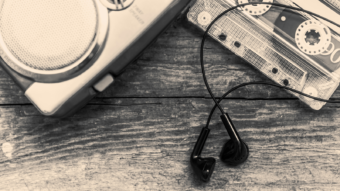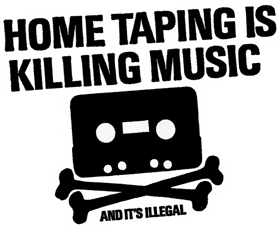An Endless Cycle- Taxing Blank Cassettes and “Killing Music”
 In today’s era of streaming and YouTube where we as consumers have the power to pick and choose the songs we listen to and curate our own playlists, the idea of a homemade mixtape is either quaint or completely alien depending on how old you are. Go back just a few decades in the UK though and you’d find heavy-handed warnings in almost every cassette tape sleeve telling you, quite matter of factly, that “Home Taping Is Killing Music” with the qualifier, “And it’s illegal”.
In today’s era of streaming and YouTube where we as consumers have the power to pick and choose the songs we listen to and curate our own playlists, the idea of a homemade mixtape is either quaint or completely alien depending on how old you are. Go back just a few decades in the UK though and you’d find heavy-handed warnings in almost every cassette tape sleeve telling you, quite matter of factly, that “Home Taping Is Killing Music” with the qualifier, “And it’s illegal”.
This oddly aggressive morality campaign, which seems to repeat itself any time a new medium is developed in the entertainment industry despite these campaigns universally failing to accomplish anything, was launched in this case as a direct result of the introduction of blank cassette tapes. Specifically, the campaign was launched by what was then known as the British Phonographic Industry (henceforth shortened to BPI) on October 28th, 1981 on behalf of basically the entire British music industry. (The BPI is a trade association that represents nearly every record label and thus nearly every musician, in the UK.)
While the technology to record or copy music onto a blank tape had existed for some time at this point, a cheap, consumer-friendly version of the technology wasn’t readily available in the UK- or, at least, it wasn’t until a man called Alan Sugar came along in 1981. Sugar, a business magnate strongly linked to the British technology sector, saw, according to his autobiography, “a Sharp-brand twin cassette deck” while travelling through Tokyo. The cassette deck, which was being sold in a store selling professional grade musical equipment, could copy inserted cassette tapes onto blank ones, and even record directly from the radio.
Sugar saw this and realised that a cheaper, consumer version of such a piece of technology had the potential to be a huge hit in the UK if consumers realised that it could be used to copy their favourite songs from the radio for the cost of a blank tape, or even copy their favourite hits directly from another tape and share them with friends. The problem was that directly promoting that the new technology could be used for unauthorized copying of copyrighted material would be illegal, which is when he hatched an ingenious idea.
After his company Amstrad had developed a cheap, consumer-grade version of the technology he’d seen in Japan, Sugar personally made sure that the advertising campaign around its launch in September of 1981 specifically mentioned that using it to copy copyrighted material was against the law. In his own words:
I told Malcolm Miller to take the precaution of putting an asterisk beside the picture of the new TS55 twin cassette tower system with its “tape to tape” logo and at the bottom of the advert, in large, bold printing, we stated, “*It is illegal to copy copyrighted material. This machine should only be used to copy material you have generated yourself”…
This was a cheeky tactic. People would read it and think to themselves, “Hey, that’s a good idea! I can use this machine to copy my mate’s Abba cassette.” That was the effect the warning had, yet there was I, keeping within the law, whiter than white, telling people that the product should not be used for that purpose…
Thanks to Amstrad’s device and the countless copycat pieces of technology it inspired, the British public could now make copies of the music they owned and, if they wanted to, copies of music they didn’t own but liked.
This thought infuriated the BPI who quickly countered its launch with the aforementioned “Home Taping is Killing Music” morality campaign. Why a morality campaign instead of focusing more on the illegality of it? Well, because home-taping (and the more modern, digital age version of it) was, and still is to some extent, a grey area legally speaking.
You see, the law, which varies a bit from country to country, doesn’t seem quite able to make up its mind on whether or not it’s legal to make copies of music you own for personal use. In the UK, for example, a high court decision was made in 2011 and made law in 2014 that made it legal to “transfer files from your own CDs or DVDs onto your MP3 player, your computer or other devices” a practise that had apparently been illegal prior to this, but was seldom enforced due to the music industry as a whole (mostly) turning a blind eye, outside of occasionally trying to make it harder to do so with various encryption algorithms.
This law itself was overturned just a year later in 2015 due to pressure from the music industry, once again making the practice illegal despite the fact that industry analysts and experts openly acknowledged that there was no consensus on how such a law could even be enforced. Likewise in the United States, while it’s unlikely that you’d ever be sued for making copies of music you own for personal use, it’s the opinion of the RIAA that consumers have no legal “right” to do so.
 Back to the 1980s- one of the reasons the BPI framed the “Home Taping is Killing Music” campaign as a moral issue more than they did a legal one (though they did note in the small print on the posters they released that home taping is illegal) is because they had no real way of stopping consumers making copies of tapes. Even though the BPI had the law, to an extent, on its side, enforcing it was impossible, so they had to instead try to appeal to the morality of consumers…
Back to the 1980s- one of the reasons the BPI framed the “Home Taping is Killing Music” campaign as a moral issue more than they did a legal one (though they did note in the small print on the posters they released that home taping is illegal) is because they had no real way of stopping consumers making copies of tapes. Even though the BPI had the law, to an extent, on its side, enforcing it was impossible, so they had to instead try to appeal to the morality of consumers…
This didn’t exactly work the way the BPI planned (shocker) and the campaign resulted in a huge push-back from both consumers and musicians, most notably the Dead Kennedys who released a special version of their EP, In God We Trust Inc on a tape with one side intentionally left blank for the explicit purpose of allowing fans to use it to copy songs they liked onto it. The blank side even included a helpful message for fans that read:
Home taping is killing record industry profits! We left this side blank so you can help.
Similar, though not as explicit, sentiments were echoed by other musicians and entities within the music industry throughout the UK at the time, much to the chagrin of the BPI. Chris Wright, the then chairman of the BPI and the man who first introduced the slogan for the campaign to the public, especially disliked how the music industry as a whole refused to unite on the issue of home taping, pointing a finger specifically at Island Records in his autobiography due to the fact they were, at the time, selling: “a chromium dioxide cassette which combined a pre-recorded album by an Island act on one side with the other side left blank for the consumer to use and tape whatever else they fancied.”
Because the world is a beautiful place sometimes, it’s noted that one of the earliest pieces of media widely introducing the concept of these tapes to the world was found in the Nov. 7, 1981 issue of Billboard magazine directly opposite an article about the launch of the Home Taping is Killing Music campaign.
While it’s easy to laugh at this, because it is kind of funny, behind the scenes the BPI were making headway towards severely limiting the rights of consumers to create personal copies of music for private use- most notably campaigning to introduce legislation that would levy a tax on all blank media which would be funneled directly back to the music industry. The BPI’s argument was that every blank tape sold represented a potential lost sale for musicians. Since the BPI couldn’t stop people from doing this, they used the age old corporate practice of lobbying the government to solve the problem for them.
However, the British government did not agree and despite repeated attempts on behalf of the BPI to introduce a tax or levy on blank media citing the precedent of similar laws existing throughout Europe, the government remained stalwart in its conviction that such a tax was unnecessary. As of 2011, the official stance of the UK government is that:
The Government considers that levies or other compensation are neither required nor desirable in the context of a narrow provision that causes minimal harm. Levies are an unnecessary and inefficient tax on consumers. They are unfair to consumers in that they are payable regardless of the use to which a levied device (for example a hard disk) is put and regardless of whether a user has already paid for the copies they store on a device. Furthermore, particularly in the current economic climate, it is not right to extract more money from the pockets of hard pressed consumers.
In any event, in 1988, CBS music attempted to similarly limit the ability of consumers to potentially make copies of copyrighted material by suing the aforementioned Alan Sugar and his company Amstrad, arguing that their twin cassette tape players facilitated illegal behaviour. In a landmark decision that set the precedent for ownership of devices that could be used to circumvent copyright, the House of Lords came to the ultimate decision that while the device could be used to illegally copy music, as it has other, legitimate uses, it was perfectly legal to own.
The Home Taping is Killing Music campaign itself largely fizzled out by the late 1980s and despite literally hundreds of thousands of pounds being spent by the BPI on it, the main effect it had was fracturing the music industry over their opinion on the legality of making copies of music you owned for personal and private use. It also, of course, helped spread the word that such copying of music was possible with the new cassette tape technology…
Although the campaign went away and was wholly ineffective, the sentiment behind it, along with similar expensive campaigns, has continued to predictably pop up with the advent of new technology that places more power in the hands of consumers to curate and create their own music and video libraries.
Beyond the more well known of these campaigns launched by the music and film industries, a somewhat lesser known one that is definitely worth a watch if you’re not familiar is the infamous Don’t Copy That Floppy ad blitz by the Software Publishers Association. Predictably, this was completely ineffective, though did give the world a hilarious time capsule of an ad we can all continue to enjoy today.
 Amusingly, the oft-mocked logo of the Home Taping is Killing Music campaign, a skull and crossbones with the skull being a stylised representation of a cassette tape, now lives on as part of the logo for the file-sharing website the Pirate Bay.
Amusingly, the oft-mocked logo of the Home Taping is Killing Music campaign, a skull and crossbones with the skull being a stylised representation of a cassette tape, now lives on as part of the logo for the file-sharing website the Pirate Bay.
If you liked this article, you might also enjoy our new popular podcast, The BrainFood Show (iTunes, Spotify, Google Play Music, Feed), as well as:
- How LaserDisc Ultimately Won the Format Wars
- Why “C” is the Default Hard Drive Letter in Many Computers
- Who Invented the Computer Mouse?
- Who Gets the Royalties for Hitler’s Book?
- Why Do Books’ Copyright Pages Have 1 2 3 4 5 6 7 8 9 10?
| Share the Knowledge! |
|





Then the DAT (Digital Audio Tape) format came out in the USA, each tape came with a hefty “piracy tax” included with the price. Which was one of the reasons DAT failed in the stereophile market.
DAT turned out to be just the ticket for backing up computer data, but to add insult to injury, the industry jacked the price up even higher for “data grade” tapes, even though they were the same exact product… DAT’s success as a backup medium was far greater than its success as a stereo medium, though.